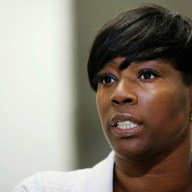 After losing a congressional run and founding her own nonprofit, Saujani says women need to be unafraid of their own ambition.
After losing a congressional run and founding her own nonprofit, Saujani says women need to be unafraid of their own ambition.
Failure is part of the deal.
Reshma Saujani wants women to fail. Well, not exactly, but in her book “Women Who Don’t Wait in Line,” Saujani makes it clear that women who take risks and fail big are the ones who are going to end up changing the ratio for women in all fields of leadership.
Saujani isn’t a stranger to failure herself. The book opens with an arresting depiction of the day after her unsuccessful run for Congress in New York in 2010. She rolls out of a bed surrounded by unopened celebratory champagne, plagued by her loss. The anecdote aptly sets up the lessons the book imparts about taking risks and embracing failure in order to achieve more.
“I think the thing is, if you haven’t failed enough you haven’t tried anything,” says the Yale Law graduate and founder of the nonprofit Girls Who Code. “It doesn’t mean you’re not going to be sad and question yourself and figure out if there’s another way, but as women we have to be OK with not taking the easy way out.”
Saujani says the book began as an exercise to move on from the loss of her congressional run and became a soothing resource. The advice she gives stresses authenticity and ambition, suggesting that women need to do more than just lean in. She says they need to hire women whenever possible so that professional networks can grow. (With pride, Saujani says that Sheryl Sandberg has been a big supporter of hers.)
“We need some more fairy godmothers, women who are going to create opportunities for each other,” Saujani says. “Men do it all the time — they see it as part of their obligation to figure out who’s going to be the one to take their place.”
For Saujani, her legacy as a public servant isn’t as clear as her intention to enact change for women. Overall, she says she’s optimistic.
“We have this generational divide. You see these young women who are impatient, that are brazen and forward-thinking. How do we continue to embrace that?” she asks, hoping her readers will find the answers.
















